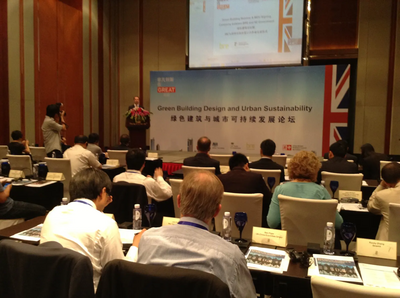The Chinese Are Coming!
Chinese Premier Li Keqiang left on Monday this week on a 5 day visit to Britain and Greece. With him, according to the press, is a 200 strong business delegation, expected to sign up some £18 billion worth of deals.

Just over 2 weeks ago, I was part of the Biz Sec, Dr Vince Cable's business delegation to China, taking in 5 cities in 6 days. Vince was scheduled to be in Beijing to attend UK-China Joint Economic & Trade Committee (JETC) talks with his opposite number, Mr Gao HuCheng, the Minister of Commerce. He took advantage of this official visit to bring with him a delegation of 80 companies and with support from the local staff of UKTI and CBBC (China Britain Business Council). We were organised into 3 groups: Construction, Water and Environment and Smart Cities(IT), each taking in a slightly different itinerary but overlapping with the Biz Sec in Shenzhen, Guangzhou and Chongqing.
As Vince highlighted in one of his addresses, China's undergoing one of the biggest phases of urbanisation, 100 times that of what Britain went through during the industrial revolution. No less than 350 million people are expected to move into the cities from now till 2030. This massive urbanisation programme offers opportunities for UK companies, especially those involved in design and engineering, environmental specialists and IT companies.
However, many of the business leaders accompanying the Chinese Premier's visit, take the form of large state-owned enterprises and investment funds, with interest in securing stakes in key infrastructural projects, such as the building of nuclear plants and high speed rail.
Which leads me to the question: how should UK and China work in "partnership"? Wherein lies the balance of power in business and in politics?
Chinese Liberal Democrats recently commissioned a report on UK-China twinned cities. Given the size/population of some Chinese cities and the greater devolved powers that Chinese municipal and provincial governments have, some of these twinnings may appear somewhat unbalanced.
To consider this and other challenges, Chinese Liberal Democrats have organised a Conference on 25 June with The University of Nottingham on this hot topic. In studying four pairings: Liverpool and Shanghai, Manchester and Wuhan, Nottingham and Ningbo, and Sheffield and Chengdu, we analysed the roles the local council, universities and businesses could play to make twinning a success and how this can be measured in terms of increased trade and job creation.
To join us in taking forward these discussions, to share best practice and find answers to our questions, you are welcome to sign up for the conference. (The registration fee for the conference will be waived for members of Liberal Democrats and friends of Chinese Liberal Democrats).
